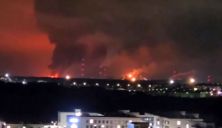There will be no serious consequences for these countries due to damage to the Balticconnector gas pipeline between Finland and Estonia. The director of energy programs of the Razumkov Center, Volodymyr Omelchenko, said this today, October 12, on the air of the FREEDOM TV channel.
He noted that it is a reversible gas pipeline that could supply gas both from Estonia to Finland and vice versa. Finland also has a powerful LNG terminal, and the share of natural gas in the country’s energy balance is only 5%.
“I don’t think there will be any critical changes in Finland’s energy supply. I don’t see any big problems here. As for Estonia, it also has the possibility to receive natural gas through the Baltic countries or from Poland. And there is also a floating platform with regasification of natural gas in the Klaipeda region, where it is also possible to obtain LNG gas. Therefore, I think that we should not expect any serious consequences for the energy industry of these countries,” said Omelchenko.
In his opinion, this is an alarming signal for Finland, which recently joined NATO, because the damage to the gas pipeline in this case can be seen as revenge against Russia.
Omelchenko noted that during the explosion of the gas pipeline and the telecommunications line, a similar handwriting can be seen to what happened a year ago with “Nord Streams”. The expert does not rule out that this is how the Russian Federation will feel NATO’s reaction. In addition, after the damage to the Balticconnector underwater gas pipeline, gas prices immediately rose by 8% — this is beneficial to Russian Gazprom.
“The very fact that two such strategic European gas pipelines explode during the year indicates that there are very high threats of undermining other gas pipelines as well. Naturally, markets react to this, prices go up. This is naturally beneficial for the Russian Gazprom and Novatek, which receive more money from this than if the situation with the security of gas pipelines was reliable,” said Omelchenko.
But it will be difficult to establish and prove Russian traces in the damage to the gas pipeline, Razumkov, the Center’s energy program director, is confident.
“As a rule, these people, these terrorists, try not to leave traces. But if it is proven that this is the Russian side, then, naturally, Russia will be presented with serious claims, I think, for billions of euros,” Omelchenko believes.













